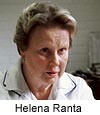
Finnish investigator Helena Ranta to testify at Milosevic trial
Helsingen Sanomat
November 26, 2002
| Finnish forensic odontologist
Helena Ranta
has been called to testify at the United Nations War Crimes Tribunal in The
Hague at the trial of former Yugoslav President
Slobodan
Milosevic.
|
 |
Ranta's
testimony is likely to be significant, because she was the head of the forensic
investigations into the events in the Kosovo village of Racak in the winter of
1999, where about 40 Albanians were killed by Serb forces.
The
event was something of a turning point in the Kosovo War. It was then that the
Western countries took active political, and finally military action: NATO
bombardment of Yugoslavia began in March of that same year.
At
the trial so far, both the prosecutors and some witnesses have made reference to
Ranta's report. Milosevic himself has also made frequent reference to Ranta's
studies at the trial which began in February this year.
The exact date of Ranta's testimony
remains
unknown, as the court will not reveal the witnesses' schedules in advance.
"I
would hope that the testimony would be given before Christmas. However, the
schedule is a bit tight, which means that I will probably go to The Hague after
the beginning of the year", Ranta said when interviewed by telephone.
She
said that she expected to be questioned intensely by both the prosecutors, and
by Milosevic.
"I
will undoubtedly have to answer questions such as whether or not the events at
Racak meet the criteria of a 'massacre'. I must be prepared for everything."
These
kinds of fine distinctions had an especially important significance in the
winter of 1999 when NATO member states were pondering whether or not a possible
bombing war against Yugoslavia would be justified.
During the investigations
Ranta found herself in a somewhat awkward situation, when she was called upon to give
a legal opinion on the events of Racak. As a doctor Ranta refused to use any
term other than "crime against humanity".
"Many
expected Ranta to say that it was a massacre. However, she was not a lawyer.
Instead, she worked to determine causes of death. Her task as a pathologist was
not to define the events in legal terms", explained prosecution spokeswoman
Florence Hartmann by telephone from The Hague on Monday.
During
the events at Racak suspicions were voiced in the world press that the forensic
team was working under pressure from the West. Ranta herself insists that there
was no attempt by the United States or Germany to influence her conclusions.
The decision to call Ranta to
testify comes at a somewhat strange time; testimony on the massacres in Kosovo
had concluded at the trial, and now the focus is on the wars in Bosnia and
Croatia.
"It
is still the same trial, even though there are many parts. At first we believed
that Ranta would not have to be there in person. We thought that her
thousand-page report would have been sufficient evidence on its own", Hartmann
said.
Experts
say that the prosecution noticed too late that Ranta's personal testimony would
be a very important part of the process.
On
the last day of the Kosovo testimony the prosecutors asked the judges for
permission to call Ranta to testify so that she might confirm what she had said
in an interview in June with the Swiss publication
Weltwoche, where she described the results of her investigations in Racak in detail.
The judges denied the prosecution's request to call her as a prosecution witness.
Instead, they decided to call her to the stand themselves. This was seen as
somewhat exceptional procedure in a UN court, where witnesses are usually called
either by the prosecution or the defence, rather than by the judges.